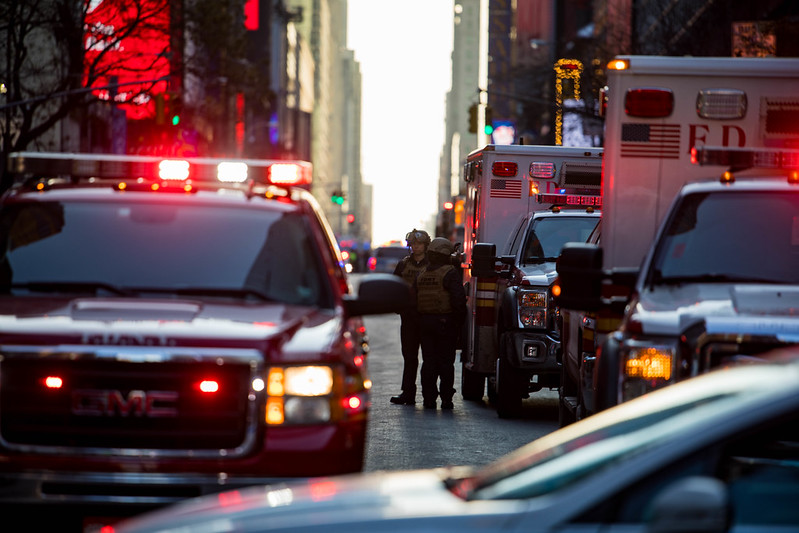
Emergency response (photo: Benjamin Kanter/Mayoral Photo Office)
Last month, Mayor de Blasio unveiled his Executive Budget for Fiscal Year 2022, which included a $112 million line item to expand his mental health teams pilot, yet to get off the ground, citywide. Minimizing the role police officers play in responding to mental health crisis calls is a sure sign of progress, but the fact of the matter is that there is absolutely no role for law enforcement in a truly compassionate and appropriate crisis response system.
Eighteen New Yorkers experiencing mental health crises were killed in police encounters in the five-year period spanning 2015-2020, to say nothing of the many others injured and otherwise harmed.
De Blasio’s proposal stops short of the transformation that’s needed to help New Yorkers get the right support in their time of crisis. There are two key issues that must be addressed if the system is to save lives: the role of police must be eliminated, beyond the 30+% of calls the city estimates will still require police intervention; and involvement of peers—those with lived mental health crisis experience—on the teams is essential.
According to the city, the proposed mental health teams, composed of a licensed clinical social worker and emergency medical technicians from the city’s Bureau of Emergency Medical Services (EMS), are to be dispatched to “urgent, non-violent mental health needs.” Whether or not police will be dispatched is entirely up to the existing 911 call center staff, who are to use their judgement to determine if someone poses a “public safety risk.” This is a pivotal decision, and one wholly inappropriate to embed within the existing 911 processes. Leaving this decision to the discretion of the NYPD’s 911 call center leaves little hope that police will be used judiciously, and endangers those in need of care.
Meanwhile, the city’s failure to meaningfully involve trained peers is unacceptable. We can’t design or deliver new services without involving the expertise of those who are most affected by those systems. “Nothing about us, without us,” has been a clarion call of the disability rights movement for decades. Why, then, has the administration failed to incorporate the recommendations of those with lived experience as they have moved to reform our crisis response system?
Our system is in need of transformation, not merely reform, and including peers in the service delivery system is the way to ensure transformative change. Without peers as required components of the new teams, the city risks replacing one flawed system with another.
Correct Crisis Intervention Today in NYC (CCIT-NYC) has developed a proposal, first shared with the de Blasio administration last spring, that properly addresses these issues. Our mental health teams consist of one trained peer and one independent emergency medical technician (EMT). Given the embedded nature of the city’s EMS within the current, flawed system, as well as EMS’ own admission that they do not wish to take on this task, we believe independent EMTs are a better choice. And, we have built our proposal on successful models found elsewhere in the country, like CAHOOTS in Eugene, Oregon, which has a nearly 40-year track record of responding to mental health crises without a single injury to those experiencing a crisis or to its staff.
Most importantly, our proposal was developed by the very people who are likely to be on the receiving end of such a system. Indeed, many of us have had experience with police officers when experiencing a crisis.
De Blasio’s initiative is a welcome first step, but the city must take another look and get this right. Failure to do so puts New Yorkers in crisis at risk of serious harm from police violence. System transformation is possible. It is long overdue. And it must happen now.
***
Cal Hedigan, CEO of Community Access, and Carla Rabinowitz, Advocacy Coordinator at Community Access, are members of Correct Crisis Intervention Today - NYC (CCIT-NYC). On Twitter @ca_nyc and @ccitnyc.
***
Have an op-ed idea or submission for Gotham Gazette? Email This email address is being protected from spambots. You need JavaScript enabled to view it.




